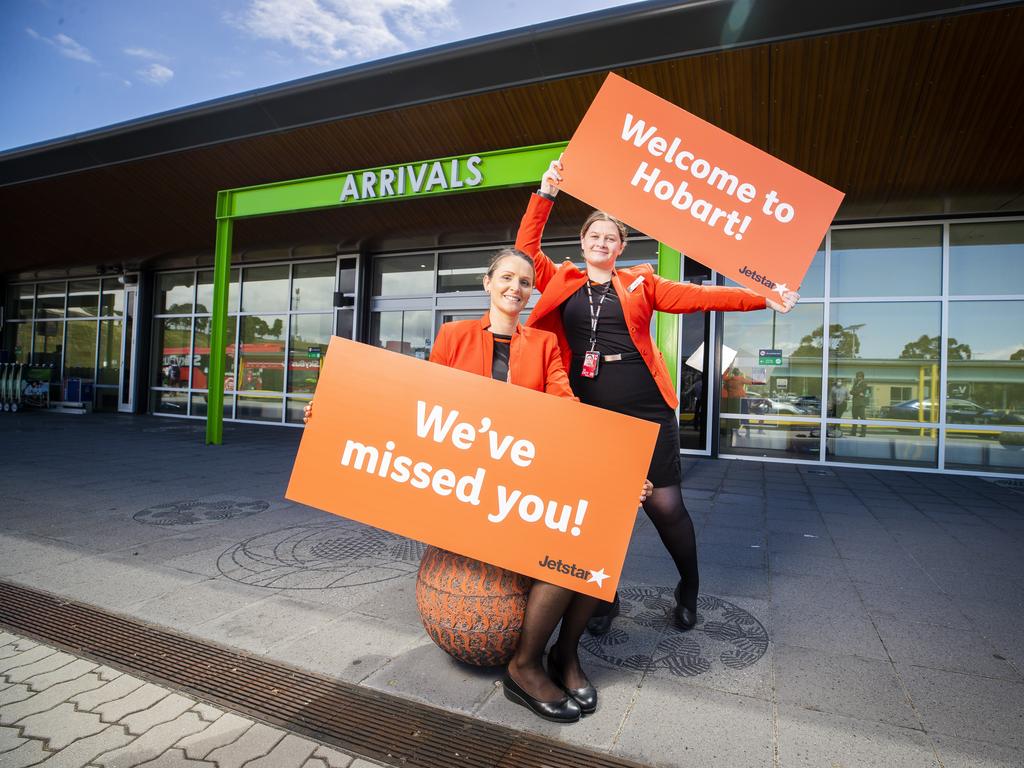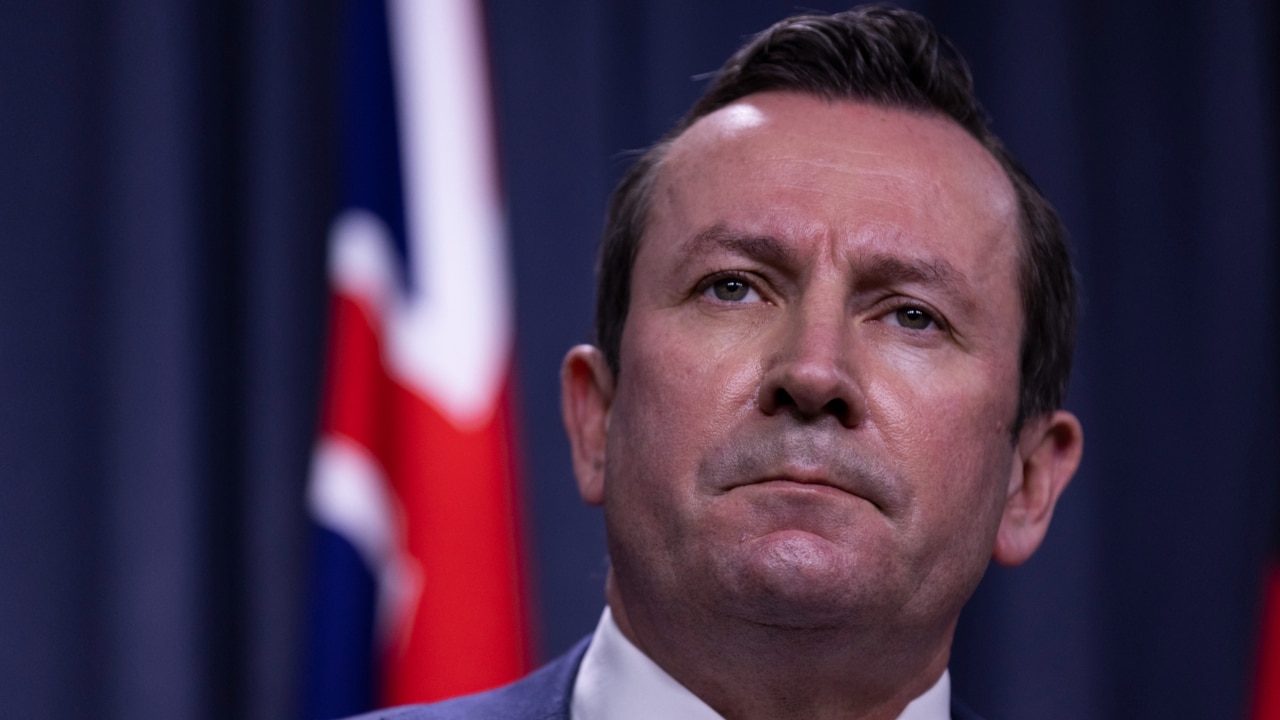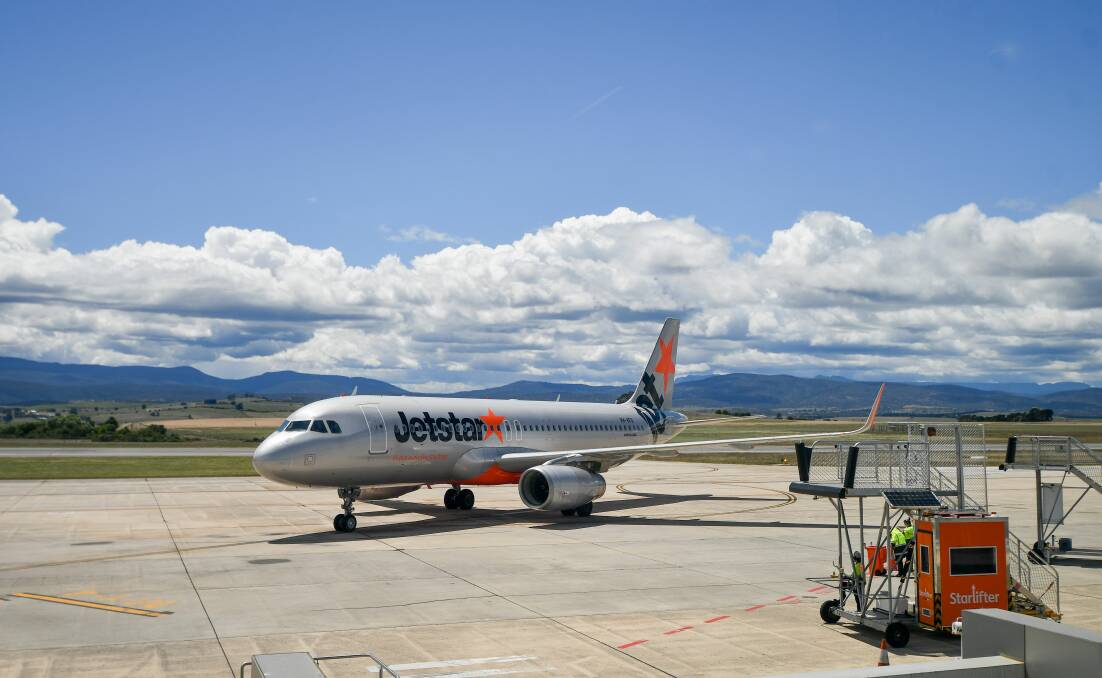- Travel Updates

What you need to know as Tasmania opens up after almost two years
Tasmania’s borders have finally come down after almost two years of Covid-19 restrictions. Here are the rules you need to know.

Aussie CEO in ‘good spirits’ after US assault

Aussie CEO bashed on work trip in US

Scary reason Aussies are leaving London
Tasmania has fully reopened to mainland Australia following almost two years of Covid-19 restrictions.
Fully vaccinated travellers from across the country will be able to visit Tasmania without having to go into hotel quarantine after the border was lifted at midnight on Wednesday.
The state’s border had most recently been closed to people coming from Victoria, NSW and the ACT.
About 95 per cent of people over the age of 12 in Tasmania have had at least one dose of a Covid-19 vaccine, with 89 per cent fully vaccinated.
Premier Peter Gutwein had hoped to reach the 90 per cent vaccination threshold before reopening but stuck to the December 15 date.
“We are one of the most vaccinated places on the planet, opening up after a period of nearly two years where we have had no Covid at all,” he told Sunrise on Wednesday morning.
“We are prepared, ready and looking forward to welcoming people back from all over the country. Many Tasmanians are looking forward to seeing family again after what has been a pretty long 22 months.”

The state is forecast to hit the 90 per cent immunisation target for over 12s later this week.
Double-dose vaccinated people entering Tasmania from Wednesday will still need to abide by strict travel rules.
All travellers to Tasmania, including returning residents, need to register their contact and travel details on the new Tas e-Travel system.
The requirements vary depending on where travellers are coming from.

Anyone who has spent time in what the Tasmanian government deems a high-riskarea in the 14 days before they plan to arrive in the state will be required to return a negative PCR test within 72 hours before departure.
As of Wednesday, the high-risk areas included the entire ACT, several suburbs in Sydney and Melbourne and a few other countries including Tonga and Samoa.
People who have spent time in an “extreme risk” area in the 14 days before they plan to arrive in Tasmania need to apply for approval before they can enter the state.
All other countries fall into the Tasmanian government’s extreme risk category if they are not identified as high or low risk on its Covid-19 website.
A respected executive who was attacked on a San Francisco street is believed to be in good spirits after spending days in an induced coma.
He was left semi-unconscious with severe injuries just hours after arriving in the major city.
A Queenslander living in London has revealed the terrifying reason she has decided to come home after less than a year in the UK.
Healthdirect Free Australian health advice you can count on.
Medical problem? Call 1800 022 222. If you need urgent medical help, call triple zero immediately
healthdirect Australia is a free service where you can talk to a nurse or doctor who can help you know what to do.
Travel and COVID-19
3-minute read
Share via email
There is a total of 5 error s on this form, details are below.
- Please enter your name
- Please enter your email
- Your email is invalid. Please check and try again
- Please enter recipient's email
- Recipient's email is invalid. Please check and try again
- Agree to Terms required
Error: This is required
Error: Not a valid value
If you develop symptoms such as severe shortness of breath or chest pain, call triple zero (000) immediately. Tell the phone operator and the paramedics on arrival if you have COVID-19.
How to avoid catching COVID-19 including getting vaccinated, wearing masks and physical distancing.
Does Australia have COVID-19 travel restrictions?
Travelling to australia.
People travelling to Australia no longer need to show proof of COVID-19 vaccination or a negative COVID-19 test result.
Some countries, airlines and ships may have their own testing, vaccination and face-mask rules. You should check with them before travelling.
During your travel to Australia, you’re encouraged to wear a face mask to reduce your risk of getting and spreading COVID-19.
For more information, visit the Department of Home Affairs website.
Travelling interstate
You can freely travel within and between Australia’s states and territories. However, some remote communities may restrict who can enter and leave them.
Learn more about travelling in Australia:
- Australian Capital Territory
- New South Wales
- Northern Territory
- South Australia
- Western Australia
Do other countries have COVID-19 travel restrictions?
Some countries may have COVID-19 entry and exit rules. You may need to:
- show proof of COVID-19 vaccination
- show proof of a negative COVID-19 test result
- show proof of COVID-19 travel insurance
- quarantine for a certain time on arrival
Related topics

COVID-19 testing
Learn about COVID-19 testing, including when to get tested, what test you should use and what to do if you test positive to COVID-19.

- COVID-19 vaccination
Find out who can get the COVID-19 vaccine, including whether it's safe during pregnancy or for older people, and when and where you can get vaccinated.
Learn more here about the development and quality assurance of healthdirect content .
Last reviewed: December 2023
Search our site for
Coronavirus (covid-19), need more information.
These trusted information partners have more on this topic.
Top results
COVID-19 information for travellers - Better Health Channel
Find out about travelling to and from Victoria, including both interstate and international advice.
Read more on Better Health Channel website

Immunisation for travel | Australian Government Department of Health and Aged Care
It’s important to protect your health when travelling overseas. You can avoid diseases and other health conditions by planning ahead for any vaccinations you may need.
Read more on Australian Government Department of Health and Aged Care website

How to cope when things outside of your control happen overseas | Cultural Identity | ReachOut Australia
It can be hard being away when something bad happens back home, especially when there is an overseas travel ban. Here are our top tips for coping when you don’t know what to do.
Read more on ReachOut.com website

COVID-19 testing - COVID-19 (Coronavirus)
Read more on NSW Health website

COVID-19 - Coronavirus in-language resources — MHCS
Feeling unwell? If you develop a fever, a cough, sore throat or shortness of breath within 14 days of overseas travel, seek medical attention
Read more on Multicultural Health Communication Service website

Covid and Crohn’s & Colitis – Crohn’s & Colitis Australia (CCA)
For more than 30 years, Crohn’s & Colitis Australia has been empowering the more than 100,000 Australian's living with Crohn’s disease or IBD.
Read more on Crohn's & Colitis Australia website

COVID-19 | SA Health
Health information about coronavirus disease (COVID-19) for South Australians. Find COVID-19 testing clinics and read the latest health updates and advice on COVID-19.
Read more on SA Health website

Cancer and COVID-19 | Cancer Council
We understand that those affected by cancer may be feeling heightened concern about COVID-19. Find out answers to your COVID-19 questions here
Read more on Cancer Council Australia website

COVID-19 is a new coronavirus that was first identified in Wuhan, Hubei Province, China in December 2019. It is a new strain of coronaviruses that hasn’t previously been identified in humans.
Read more on WA Health website

COVID-19 - Resources
COVID 19 has been identified as a key issue for health and aged care. Information for being prepared in aged care, services and organisations, workforces, older people and their families on ELDAC website.
Read more on End of Life Directions for Aged Care ELDAC website

COVID-19 vaccines in 2023 - Australian Prescriber
As SARS‑CoV‑2 continues to evolve, vaccines are being updated, and policymakers are reviewing the optimal timing of future booster doses to maintain adequate protection against severe illness, particularly for older adults.
Read more on Australian Prescriber website

Mpox (formerly known as monkeypox) | NCIRS
Mpox vaccines: Frequently asked questions NCIRS fact sheets, FAQs and other resources Australian Immunisation Handbook COVID-19 vaccines Immunisation coverage data and reports Education and training History of immunisation Immunisation schedules National and international resources NCIRS fact sheets, FAQs and other resources COVID-19 DTPa-HB-IPV-Hib vaccine (Vaxelis® and Infanrix hexa®) Haemophilus influenzae type b (Hib) Hepatitis B Human papillomavirus Influenza Japanese encephalitis Measles Measles vaccination catch-up guide Meningococcal Mpox (formerly known as monkeypox) Mumps Pertussis Pneumococcal Poliomyelitis Respiratory syncytial virus (RSV) Rotavirus Rubella Varicella-zoster (chickenpox) Zoster (shingles) Injection site reactions Vaccine components Vaccines for Australian adults Vaccinations during pregnancy NCIRS webinar series Patient communication resources Specialist immunisation services SKAI - supporting health professionals NCIRS newsletters Vaccine safety NCIRS fact sheets, FAQs and other resources Australian Immunisation Handbook COVID-19 vaccines Immunisation coverage data and reports Education and training History of immunisation Immunisation schedules National and international resources NCIRS fact sheets, FAQs and other resources COVID-19 DTPa-HB-IPV-Hib vaccine (Vaxelis® and Infanrix hexa®) Haemophilus influenzae type b (Hib) Hepatitis B Human papillomavirus Influenza Japanese encephalitis Measles Measles vaccination catch-up guide Meningococcal Mpox (formerly known as monkeypox) Mumps Pertussis Pneumococcal Poliomyelitis Respiratory syncytial virus (RSV) Rotavirus Rubella Varicella-zoster (chickenpox) Zoster (shingles) Injection site reactions Vaccine components Vaccines for Australian adults Vaccinations during pregnancy NCIRS webinar series Patient communication resources Specialist immunisation services SKAI - supporting health professionals NCIRS newsletters Vaccine safety Mpox (formerly known as monkeypox) has been declared a Communicable Disease Incident of National Significance in Australia
Read more on National Centre for Immunisation Research and Surveillance (NCIRS) website

Resource library | Lifeblood
Our resources can be freely downloaded, and printed copies of selected resources can also be ordered at no cost.
Read more on Australian Red Cross Lifeblood website

Clinical indications | Lifeblood
Some types of anaemia, thrombocytopenia and platelet function disorders, bleeding disorders and massive transfusion are common clinical indications for blood components.
Emergency provision of red cells | Lifeblood
In emergency situations, it’s important for individuals requesting a transfusion to clearly inform the laboratory staff of the urgency of transfusion.
Adverse events | Lifeblood
Adverse transfusion reactions are when patients experience an undesirable response associated with transfusion of blood or blood products.
Red cell reference | Lifeblood
Our Red Cell Reference Service provides an internationally recognised scientific and diagnostic service to support transfusion practice and clinical need. Their primary role is to determine red cell phenotypes and antibodies to help find the most suitable specialised blood component for each patient.
Transplantation and immunogenetics services | Lifeblood
This expert team delivers agile and efficient transplantation and immunogenetics diagnostic testing services and scientific expertise for solid organ and stem cell transplants and platelet and neutrophil immunobiology diagnostics across the country.
Learn | Lifeblood
We provide an innovative range of education events and resources for health professionals to support safe transfusion practice at any stage of their career.
Management of mammalian bites
Reproduced with permission from The Royal Australian College of General Practitioners
Read more on RACGP - The Royal Australian College of General Practitioners website

Healthdirect Australia is not responsible for the content and advertising on the external website you are now entering.
Healthdirect 24hr 7 days a week hotline
24 hour health advice you can count on
1800 022 222

Government Accredited with over 140 information partners
We are a government-funded service, providing quality, approved health information and advice

Healthdirect Australia acknowledges the Traditional Owners of Country throughout Australia and their continuing connection to land, sea and community. We pay our respects to the Traditional Owners and to Elders both past and present.
© 2024 Healthdirect Australia Limited
Support for this browser is being discontinued
Support for this browser is being discontinued for this site
- Internet Explorer 11 and lower
We currently support Microsoft Edge, Chrome, Firefox and Safari. For more information, please visit the links below:
- Chrome by Google
- Firefox by Mozilla
- Microsoft Edge
- Safari by Apple
You are welcome to continue browsing this site with this browser. Some features, tools or interaction may not work correctly.
- Australia News
- Coronavirus
Tasmania scraps travel restrictions for the fully vaccinated while unvaccinated arrivals still face five days quarantine
Tasmanian Premier Peter Gutwein has unveiled a major overhaul of the requirements for fully vaccinated arrivals while unvaccinated travellers still face tough restrictions.

Fully vaccinated travellers heading to Tasmania will no longer be required to get a negative COVID-19 test before arriving while the unvaccinated will still face the current requirements.
Premier Peter Gutwein announced the relaxed border restrictions on Tuesday as the state begins its transition to living with the virus.
“We are moving through a transition stage to where we can live with COVID in the same way we can live with flu or other respiratory diseases,” he said.
From midnight on Tuesday, fully vaccinated travellers will no longer be required to register their travel or take a COVID-19 test prior to travelling.

Stream the latest news on COVID-19 with Flash. Stream more than 20 global & local news sources. New to Flash? Try 14 days free now
For those who are unvaccinated and aged over 12 years and two months, they will still need to register their trip and produce a negative rapid test within 24 hours of their arrival or a negative PCR test within 72 hours of travelling.
Unvaccinated arrivals will also still face five days in quarantine upon entry into Tasmania and will need to get a negative test on day five before leaving quarantine.
Mr Gutwein said the government’s decision came off the back of lower than expected hospital admissions.
“The main metric is protecting our health system and while we’re not seeing the numbers in hospital that other jurisdictions are, principally as a result of the higher vaccination rate that we’ve got across the community,” he said.
“We do know that the evidence in other states such as Queensland for example demonstrates that unvaccinated people are up to 24 times more likely to end up in an ICU than someone who is vaccinated.

“That’s why that particular border measure regarding unvaccinated travel will remain in place for the moment.”
The announcement came as Tasmania recorded 1,310 new cases of the coronavirus in the past 24 hours, taking the total number of active cases to 6,417.
There are 25 people currently in hospital with COVID-19 and two patients requiring intensive care treatment.
Public Health Director Mark Veitch admitted the state was not quite at the peak of their current wave adding that hospital admissions were expected to rise in the coming days.
“We have had a bit over 1000 cases for over a week. I do not think we are quite at a peak,” Dr Veitch said.
“We would expect more hospitalisations in the coming days as some people get sick enough to need hospital care.”
The Premier also confirmed students will return to school on February 9 with a COVID-safe return to school plan to be revealed this week.
Add your comment to this story
To join the conversation, please log in. Don't have an account? Register
Join the conversation, you are commenting as Logout

Jeremy Rockliff
Premier of tasmania, 18 january 2022 peter gutwein, premier, changes to border entry requirements for vaccinated travellers.
The health and safety of Tasmanians remains our number one priority as we continue through the transition phase of learning to live with COVID-19.
As part of this transition and in line with our commitment to review arrangements after one month of our borders reopening, from midnight tonight all vaccinated travellers will no longer be required to register their travel or to take a COVID-19 test prior to travelling.
This is based on public health advice and is part of our transition to living with COVID-19 and returning to a more normal way of life once this transition phase ends.
However, the current rules remain in place for those who are not vaccinated unless they have a valid medical exemption.
This means people who are not vaccinated must continue to register their travel on the Tas-E-Travel app, have a negative COVID-19 test prior to travelling (either a RAT within 24 hours prior or a PCR within 72 hours prior), and undertake a minimum of five days’ quarantine on arrival, along with producing a negative COVID-19 test on day five to leave quarantine.
While these rules will be reviewed in coming months, the evidence in other jurisdictions such as Queensland shows that unvaccinated people are up to 24 times more likely to end up in ICU than someone who is vaccinated.
This clearly shows the importance of being vaccinated, and that’s why we will continue to step down our COVID border safeguards in a sensible and responsible way, to ensure our health system can continue to cope.
This is a challenging time, but things will get better as we transition out of this phase and live with COVID-19 in our community in coming months.
I encourage Tasmanians to keep doing the little things as we continue through this period – keep up your COVID-safe behaviours, maintain good hygiene, stay home if you’re unwell, and if you’re due for your vaccination or a booster, then please turn up.
More Media Releases from Peter Gutwein
More Media Releases from the Premier
Vaccinated or unvaccinated, find out what you can and can't do now borders are open
Tasmania's borders are now open.
Subscribe now for unlimited access .
Login or signup to continue reading
Launceston Airport is set to welcome more than 2000 arrivals today as borders open to the rest of the country.
Depending on where you're going and where you're coming from, the rules look very different.
Here's what you need to know if you're hoping to travel this Christmas and New Year period:
Coming to Tasmania

Travellers to Tasmania, including returning residents, need to provide their contact and travel details before entering the state, to help manage the risk of COVID-19 at Tasmania's borders.
All travellers must register through the Tas e-Travel system and you will be required to scan your QR code on arrival in Tasmania.
You must have evidence of your vaccination certificate and - if required - a negative result from your COVID-19 PCR pre-departure test.
Arriving from a low-risk area: You do not need to be tested for COVID-19 or quarantine and just need to register your travel via the Tas E-Travel website.
Arriving from a high-risk area:
- You are required to return a negative COVID-19 PCR test within 72 hours before departure to Tasmania.
- If you are Tasmanian and have been out of the state for less than 7 days, you do not need to receive a test prior to entering the state, but you are required to be tested within 24 hours of returning. You do not need to quarantine while you wait for the test result unless you have symptoms. If a positive result is returned you will be contacted by Public Health authorities.
- If you cannot provide evidence of your vaccination status or negative test result on arrival, you will be required to quarantine for up to 14 days or until you can provide evidence of vaccination or a negative COVID-19 PCR test on or after day five.
Unvaccinated
You must apply for approval to enter Tasmania regardless of where you have been before arrival. Visit www.coronavirus.tas.gov.au for information on how to apply to enter the State.
If you cannot provide evidence of your vaccination status, you will be required to quarantine for up to 14 days or until you can provide evidence of vaccination.
What do I do if I don't have a smartphone?
Travellers will be able to complete a manual form on arrival and will also be required to demonstrate the necessary evidence.
This information is available on the COVID-19 website, and can also be obtain by calling the Public Health Hotline on 1800 671 738
People without smart phones are able to present a hard copy of their COVID test result present on arrival.
Private pathology clinics in other jurisdictions will conduct pre-travel COVID-19 tests and will generally provide a COVID-19 testing and results certificate to the traveller.
If you can't access your COVID-19 vaccination certificate online, you can ask your GP to print your immunisation history statement.
I'm a FIFO worker in a high-risk area. How do I get a test when I don't have access to a testing site prior to departure?
If you cannot provide evidence of your negative test result on arrival, you will be required to quarantine until you can provide evidence of a negative COVID-19 PCR test on or after day five.
If a COVID-19 test is taken after arrival, you will be advised to stay home until you get a negative test result. You need to upload the result to the Tas e-Travel system .
Can I get a rapid antigen test before travelling?
Simple answer, no.
A test must be a Polymerase Chain Reaction (PCR) test, which involves nasal and throat swabs. This type of test is highly accurate and considered the gold standard for detecting an active infection of COVID-19.
You are exempt from the testing requirement if:
- You are under five years of age; or
- You have a current medical exemption from requiring undertaking a PCR COVID-19 test; or
- You are a transport, freight and logistics worker or international aircrew complying with the testing regime that applies to these workers.
International travel - extreme-risk areas
If vaccinated you will be required to produce a negative COVID-19 test 72 hours prior to travel then quarantine for seven days in a suitable premises, which could be home-based, on arrival.
You will be tested on day 1, 5 or 6 and on day 13.
You will be required to produce a negative COVID-19 test 72 hours prior to travel, then quarantine in a designated facility for 14 days at your place of arrival (which would not be in Tasmania) with testing in place on day 1-5 or 6-13.
READ MORE: Daughter tells inquest of last night she saw her mum
The only international exceptions to the extreme risk classification are Singapore, Samoa, Vanuatu, Tonga and the South Island of New Zealand which fall under the same category as a high risk jurisdiction where requirements are to be fully vaccinated and produce a COVID-19 negative test 72 hours prior to travel.
This also applies to Antarctica only for international expeditioners from Hobart to Christchurch who quarantine prior to their departure.
COVID management
I've visited a low exposure site, what do i do.
If you have visited a low-risk exposure site, you must monitor yourself for symptoms.
You must get tested if you develop symptoms, even if they are mild. You are not required to quarantine.
I've been told I am a casual contact, what does this mean?
A casual contact is someone who has been in the same place as a confirmed case during their infectious period but does not meet the requirements for a close contact. You must get tested between days 3 and 5.
You are not required to quarantine but you must wear a mask for 14 days from exposure to the COVID-19 case, when you can't physically distance from others.
If you develop symptoms before or after the required test, you should isolate and have a test immediately. The requirements for casual contacts are the same for vaccinated or unvaccinated people.
I am a close contact of someone who has tested positive, what do I do?
Vaccinated:
You must quarantine immediately and have a COVID-19 test. You must get tested again on day 5 or 6.
If your test results are negative, you will be released from quarantine after 7 days. You must also be tested again on day 12 or 13.
If you develop symptoms between the required tests, you should isolate and have a test immediately.
Unvaccinated:
You must quarantine immediately for 14 days from exposure to the COVID-19 case.
You must have a minimum of two COVID-19 tests. You will need to be tested immediately at the start of your quarantine, and again on day 12-13.
If your test results are all negative, you will be released from quarantine after 14 days.
Someone I live with has tested positive. Do I have to quarantine?
People who are vaccinated and in the same household as a close contact are not required to quarantine but should limit further exposure to the contact and avoid high-risk settings for 14 days. If you show symptoms, you should get tested.
People who are unvaccinated and in the same household as a close contact must also follow the quarantine requirements.
I'm a business owner, and a positive case visited my premises. Do I have to shut?
If Public Health notifies you that a confirmed COVID-19 case is linked to your workplace, they will work with you to identify what you need to do to protect other people and continue normal activities within your business as soon and as safely as possible.
The initial steps Public Health may ask you to take are to review and activate your COVID-19 Safety Plan and/or Outbreak Management Plan , Organise cleaning and disinfection of frequently touched areas, and instruct people in your setting to wear face masks.
I'm not vaccinated, can I still enter certain premises?
Unvaccinated patrons cannot enter pubs, nightclubs, bars and event (such as music festivals) where people are freely mixing and moving, including drinking standing up.
When and where do I need to wear a mask?
The wearing of masks are recommended where you cannot physically distance in indoor spaces. There are situations when wearing a mask is mandatory in Tasmania. The mask must cover your mouth and nose.
Face masks must be worn by everyone aged 12 years and older who is:
- in an indoor area of the airport that is open to passengers or a member of the public;
- boarding a commercial domestic aircraft, including when on the tarmac;
- on board a commercial domestic aircraft in Tasmanian airspace;
- in an indoor area of the Spirit of Tasmania terminal that is open to passengers or other members of the public;
- in a vehicle that is at the Spirit of Tasmania terminal, on board the vessel, or while proceeding through the Biosecurity screening and other check points;
- in a communal area on board the Spirit of Tasmania vessel while the vessel is at the terminal or in Tasmanian waters; and
- in a public hospital
- in a private hospital
- in a day-procedure facility
- at any event that has more than 1000 people in attendance, regardless of whether the event is seated or unseated, indoors or outdoors. This includes while queuing, entering or exiting from the event.
Our journalists work hard to provide local, up-to-date news to the community. This is how you can continue to access our trusted content:
- Bookmark www.examiner.com.au
- Make sure you are signed up for our breaking and regular headlines newsletters
- Follow us on Twitter: @examineronline
- Follow us on Instagram: @examineronline
- Follow us on Google News: The Examiner
More from Local News
Housing shortage: tasmanian government should follow queensland lead, 'we want to attract and retain': government plan to bring festivals north, the ads that will change the way parents feel about facebook, rspca tasmania to close launceston and latrobe adoption centres, end of an era: northern footballers reminisce on classic tsl derby contests, 'total lack of control': calls for state government to stop vape legislation.
Advertisement
Get the latest Launceston news in your inbox
Sign up for our newsletter to stay up to date.
We care about the protection of your data. Read our Privacy Policy .

- Worried about a child's safety?
Quick links
- Information for families
- Information for young people
- Staff Login
- Safe children - All Topics
- Need help now?
- Reporting concerns about the safety or wellbeing of a child
- Your rights as a child or young person in care
- About the Child Safety Service
- Child Safety Service Care Teams
- The role of the Court in keeping children and young people safe
- Keeping children and young people connected with family
- Supporting families to keep their children safe and well at home
- Bringing Baby Home Program
- Guardianship transfer for children in Out of Home Care
- What is Out of Home Care?
- Returning to your family after being in care
- Child advocates for Out of Home Care
- Making a complaint about the Child Safety Service
- Safeguarding Training
- Appropriate relationships between adults and children and young people
- About the Office of Safeguarding Children and Young People
- Guiding resources for safeguarding children and young people
- Our framework for safeguarding children and young people
- Our response to inquiries into institutional child sexual abuse
- About youth justice services in Tasmania
- Youth justice reform in Tasmania
- About adoption in Tasmania
- Abuse in State Care Support Service
- Out of Home Care system
- Tasmanian Out of Home Care Standards
- Wellbeing in Out of Home Care
- Family based care
- Support to transition from Out of Home Care
- Wellbeing - All Topics
- Medical conditions
- COVID-19 information and measures at our sites
- Infectious diseases and your child
- Drugs, alcohol and smoking at school
- Immunising your child
- Meal time support for students with dysphagia
- Sanitary products in schools
- National Student Wellbeing Program
- Trauma support resources
- Bushfire and heatwave
- Student behaviour
- Keeping children safe against discrimination, bullying and harassment
- Healthy eating schools and canteens
- Grandparents caring for grandchildren
- Support for students who are caring for others
- Student Wellbeing and Engagement Survey answers for students
- Student wellbeing data
- Student Wellbeing and Engagement Survey answers for families
- Student Wellbeing and Engagement Survey answers for our community
- Learning - All Topics
- School terms and holidays
- Find your local primary school
- Find your local high school
- School directory
- At-capacity schools
- FAQs about local school areas
- Contacts for school intake areas
- Enrolling your child at school
- School fees, levies and charges
- Financial assistance for school costs
- Enrolling as an adult
- Working Together
- Child and Family Learning Centres (CFLCs)
- Early Childhood Inclusion Service (ECIS)
- School starting and leaving ages in Tasmania
- Employment while studying
- Curriculum in Tasmanian Government schools
- Student assessment programs
- Year 10 Transition Statements
- Student dress codes and uniforms
- Travelling to school
- Student accommodation
- Year 11 and 12 Course Guide
- Years 11 and 12 extension schools
- Year 12 Completion Letters
- Education and training after Year 10
- School attendance and absences
- Authorised Persons
- School speech and language pathologists
- School social workers
- Vision support services in schools
- Hearing support services in schools
- School psychologists
- Nationally Consistent Collection of Data on students with disabilities
- Support in schools for students with disability
- Educational adjustments funding for students with disability
- Support for gifted and highly able students
- Support for gifted and highly able students online courses
- Tasmanian Autism Diagnostic Service (TADS)
- English as an additional language (EAL) support
- Quality learning for all
- What laws and policies guide inclusive education in Tasmania?
- Sustainability Learning Centre
- Field Study Centres
- Swimming and Water Safety Program
- Trade Training Centres
- Lifelong Learning
- Aboriginal Education Services
- LGBTIQA+ equality in Tasmanian government schools
- LGBTIQA+ equality and inclusion in education
- Studying in Tasmania for international students
- How to enrol as an international student in Tasmanian Government schools
- Alma Lily Stackhouse Scholarship
- What Matters? writing competition
- The Frank MacDonald Memorial Prize
- Tasmanian Training Awards
- WorldSkills Australia competitions
- English as an Additional Language (EAL) support and model
- Working with External Support Providers in schools
- Providing NDIS services at school
- Eduroam WiFi
- Community Liaison – Sport
- Supporting students impacted by trauma
- About us - All Topics
- Our contacts
- Complaints – schools and Child and Family Learning Centres (CFLCs)
- Making a complaint about Services for Youth Justice
- Alerts and closures
- About the department
- Our structure
- Ministerial portfolios
- Department budget
- Apply with us
- DECYP school psychology scholarship
- Teach on the Tasmanian West Coast
- DECYP speech pathology scholarship
- Youth justice careers
- Teaching careers
- Child safety services careers
- Professional student support services careers
- Premier’s Reading Challenge
- Young Archies Awards
- NAIDOC Week
- Our Strategic Plan
- Our approach to school improvement
- Tasmanian Quality Standards Kindergarten (TQSK)
- Education Workforce Roundtable
- Our Approach to Child and Student Wellbeing
- Belonging, Being and Becoming – the Early Years Learning Framework
- Together with Families
- Agricultural Framework
- Data and statistics
- Legislation
- Department for Education, Children and Young People RTO
- School Associations for Tasmanian Government schools
- Early Learning for Three Year Olds initiative
- Conducting research
- Applications for artists in schools residency
- Infrastructure projects
- Our websites
- Website accessibility and translation
- Copyright and Disclaimer
- DECYP Social Media Terms of Use
- Staff resources
- Partnering with external organisations
- Strong partnerships with Education and Care providers
- Community Language School grants
- Communicate with schools – Infostream
- Strong Families Safe Kids: Next Steps
- Under 16 Lighthouse Project
Information for families, students, staff and visitors on COVID-safe behaviours, and how we are managing COVID-19 at our sites.
- Key information
- The COVID-safe schools plan 2024 (PDF, 188KB) sets out how we’ll continue to safely manage COVID-19 in schools.
- Key measures are outlined below.
- This plan follows Public Health advice.
- While this plan focuses on schools, the practical advice applies to our other sites.
- COVID-safe behaviours
- Do not come to school if unwell – this applies to staff, students and visitors.
- Staff, students and visitors are asked to practise all COVID-safe behaviours, particularly as they apply to their personal circumstances.
- Keep your hands clean by using soap and water or hand sanitiser.
- All students, staff and visitors are supported to wear masks should they choose to.
- Consider wearing a face mask indoors where you cannot physically distance from others.
Vaccination
- Staying up to date with COVID-19 vaccines helps protect you from severe illness due to COVID-19.
- Staff, students and visitors are encouraged to be vaccinated against COVID-19 and influenza (the flu).
Supporting COVID-safe behaviours
- Hand sanitiser and face masks are available at all sites for anyone to use.
Ventilation
- Spaces are well-ventilated through natural airflow where possible.
- Other mechanical equipment may be used to promote airflow and improve ventilation.
- Schools will take advantage of outdoor learning opportunities.
- Regular cleaning is undertaken.
- Family engagement
- do not have symptoms
- practise COVID-safe behaviours
- follow any school advice.
- Schools may need to implement additional risk mitigations for events and activities to minimise the risk of COVID-19, such as limiting the number of attendees or requiring physical distancing.
- School activities
- excursions (day and overnight)
- school camps
- fairs and carnivals
- productions
- prize nights.
- Activities should encourage COVID-safe behaviours and consider the COVID-19 risk in the community at that time as part of activity planning.
- spaces are well-ventilated
- face masks are readily available
- physical distancing is supported; or
- the numbers of participants are limited.
- Intrastate travel can go ahead with appropriate Department approval and a risk mitigation plan. This includes overnight excursions and camps.
- Travel for school groups
- Interstate and international travel can occur with a risk assessment and contingency plan in place.
- Department approval is needed for interstate and international travel.
- Considerations for travelling must be revised before departure to ensure the risk assessment remains up to date.
- Vulnerable students
- All Tasmanians have a role to protect the vulnerable. By following COVID-safe behaviours and staying home when unwell, you help protect vulnerable students from the impacts of COVID-19.
- School staff wear masks when working closely with students known to be medically vulnerable to COVID-19.
- Staff do not provide direct support to students medically vulnerable to COVID-19 for at least seven days from testing positive to COVID-19.
- Support Schools have additional restrictions for COVID positive cases and close contacts.
- School attendance is important
Being at school is the best place for our kids. It’s where they learn and grow alongside their friends, and where they benefit the most.
Every school day matters. Your child should be at school unless:
- they’re feeling unwell
- have medical advice due to an ongoing medical condition
- they’ve been told to stay home by Public Health.
- Health and wellbeing
These resources can help when talking to your child about COVID-19:
- Emerging Minds
- Red Cross .
Please seek professional help if needed. Support services include:
- Kids Helpline on 1800 551 800
- Lifeline on 13 11 14
- Beyond Blue on 1300 224 636.
- More information
For the latest information visit:
- Tasmanian Department of Health website
- Australian Government Department of Health website
- General COVID-19 enquiries – Tasmanian Public Health Hotline on 1800 671 738
- Catholic Education Tasmania on 03 6210 8888
- Independent Schools Tasmania on 03 6224 0125.
Published May 16, 2024
On this page +
Pages in this section +.
- Mental health and wellbeing
- Dealing with emergency or disaster
- Food in schools
- Support for carers
- Student Wellbeing and Engagement Survey
COVID-19 vaccination
Stay up to date with your COVID-19 vaccines, including booster doses.
- Staying up to date with your COVID-19 vaccines, including booster doses, will help protect you from severe illness due to COVID-19.
- COVID-19 vaccination, including booster doses, is especially important for people who are at higher risk of becoming seriously unwell from COVID-19, including older Tasmanians and those with certain medical conditions.
- You can get free COVID-19 vaccinations (including booster doses) at GP clinics or participating local pharmacies. Contact your local GP or pharmacy to book an appointment, or book online using the health direct service finder .
- If you have questions about COVID-19 vaccinations please speak to your GP, healthcare provider, or call the Tasmanian Public Health Hotline on 1800 671 738 .
Was this page useful?
What did you like about it.
Don't include any personal information. If you need a response, send an enquiry instead.
How can we make it better?
Tasmania to reopen travel with Queensland after downgrade in COVID outbreak
Tasmania will downgrade all of Queensland to "low" COVID-19 risk from Wednesday, allowing travel without quarantine between the two states.
Key points:
- The Tasmanian ban on travellers from certain areas in Queensland will be lifted from Wednesday
- People thinking of driving through New South Wales have been warned they will be deemed as having been in a high-risk area
- The public can attend the AFL match in Hobart on Sunday — but must wear a mask
Only Queensland travellers who have been in a listed "high-risk" premises will still face restrictions.
The COVID outbreaks on the mainland have led Tasmanian health authorities to ban travellers from Victoria, New South Wales, the ACT and anyone from the Northern Territory who has been in Greater Darwin and Katherine.
Only returning Tasmanian residents and anyone deemed an essential traveller can receive a G2G pass to enter the state from those jurisdictions.
Premier Peter Gutwein said Tasmania remained "under constant threat" from the Delta strain of coronavirus.
He said the ban in place for those coming from NSW would "remain in place for the foreseeable future".
Travellers cannot drive through NSW at all
Mark Veitch, the director of Public Health, said even people who "drive their car through New South Wales" would be deemed to have been in a high-risk area by Tasmanian authorities.
That means Queensland travellers hoping to avoid quarantining will not be able to drive through NSW, even just with stops for fuel, in order to reach Tasmania on the Spirit of Tasmania ferry.
Those who attempted it would be "required to go into hotel quarantine, if indeed you are allowed into Tasmania at all", Dr Veitch said.
"We really don't want people getting into a car at the Queensland border and driving non-stop to Victoria … it is just not safe."
Dr Veitch said the "worst-affected" area of Dubbo was of concern due to the region "very quickly reaching well over 100 cases", pointing to the "very mobile population".
Mr Gutwein also said attendees at Sunday's AFL fixture between St Kilda and Fremantle at Blundstone Arena would be required to wear masks.
He said teams and staff would be regularly tested and leave after the match is completed.
More information on the current state of restrictions can be found on the Tasmanian government's coronavirus website .
- X (formerly Twitter)
Related Stories
Lance jumped at the chance to get his covid vaccine, but others don't find it easy to understand public health messages.
- Health Administration

IMAGES
COMMENTS
Tasmania was quick to pull up the drawbridge when coronavirus started to spread throughout Australia but it now faces the prospect of hundreds of COVID-19 cases a day. ... abc.net.au/news/when-can ...
If you develop COVID-19 symptoms while in Tasmania, get tested, and if it's an emergency, phone 000. See the COVID-19 website for information. Out and about. Across Tasmania's cities and regions there are myriad chances to safely enjoy a holiday. Here are a few ideas. OUTDOOR ACTIVITIES. Tasmania's great outdoors are… well, great.
Tasmania's border entry conditions depend on your COVID-19 vaccination status — fully vaccinated or not — and whether you have been in an area declared high or extreme risk. This page lists ...
COVID-19 is an infectious disease caused by a virus called SARS-CoV-2 that can be severe, particularly for people who are not up to date with vaccination - or have conditions that increase their risk of complications. Some coronaviruses cause illness in humans, and others cause illness in animals. Rarely coronaviruses that usually only affect ...
The health, safety and wellbeing of Tasmanians is the Government's number one priority as we continue through the recovery phase of the COVID-19 pandemic. From today, there is a new screening process for travellers arriving in Tasmania through both our air and sea ports. This is another tool to mitigate the risk of COVID-19 coming into our State.
Tasmania has fully reopened to mainland Australia following almost two years of Covid-19 restrictions. ... need to register their contact and travel details on the new Tas e-Travel system.
As the number of COVID cases in Tasmania continues to rise, the state's testing clinics have been swamped by an increase in demand. Part of Tasmania's border reopening plan required travellers to ...
Reporting your symptoms after a vaccination helps ensure COVID-19 vaccines are delivered as safely as possible in Tasmania. You can report your symptoms following vaccination to the Department of Health, Tasmania by calling the Public Health Hotline on 1800 671 738 or emailing a completed adverse events following immunisation form (Word or PDF ...
Listen. 30 September 2022. National Cabinet has announced changes to isolation requirements for positive COVID-19 cases. From 14 October 2022 individuals who have COVID-19 symptoms are encouraged to stay at home while they remain unwell, but it will no longer be mandated for them to remain in isolation for 5 days.
People travelling to Australia no longer need to show proof of COVID-19 vaccination or a negative COVID-19 test result. Some countries, airlines and ships may have their own testing, vaccination and face-mask rules. You should check with them before travelling. During your travel to Australia, you're encouraged to wear a face mask to reduce ...
Fully vaccinated travellers heading to Tasmania will no longer be required to get a negative COVID-19 test before arriving while the unvaccinated will still face the current requirements.
Tasmania will open its border to all vaccinated travellers from December 15 without a need for quarantine. Interstate and international travellers will need to provide a negative COVID test within ...
This means people who are not vaccinated must continue to register their travel on the Tas-E-Travel app, have a negative COVID-19 test prior to travelling (either a RAT within 24 hours prior or a PCR within 72 hours prior), and undertake a minimum of five days' quarantine on arrival, along with producing a negative COVID-19 test on day five ...
There is currently an outbreak of the coronavirus (COVID-19) with confirmed cases in Australia. The Tasmanian Government has introduced a number of orders that impact visitors currently in Tasmania or considering travelling to Tasmania. As the situation continues to evolve, it is important that you seek up-to-date information from the relevant ...
Travellers to Tasmania, including returning residents, need to provide their contact and travel details before entering the state, to help manage the risk of COVID-19 at Tasmania's borders.
Important Covid-19 Travel Notice. Tasmania.com Customers: In response to Conronavirus (COVID-19) the Tasmanian Government has declared a state of emergency for Tasmania and has announced that as of midnight 20 March 2020 all "non essential" interstate and international travellers to Tasmania will need to self-isolate for a period of 14 days.
Tasmania's border reopening comes with the state having fully vaccinated 90 per cent of those residents aged over 16 years. However, just 65 per cent of the 12-15 age group have received two doses ...
The Department of Health has launched a service to support Tasmanians. If you test positive to COVID-19 you should stay home if you have ongoing respiratory symptoms (cough, runny nose, sore throat, difficulty breathing) and take extra precautions in the days following to minimise the risk of spreading COVID-19.
Australian Government Department of Health website. General COVID-19 enquiries - Tasmanian Public Health Hotline on 1800 671 738. Catholic Education Tasmania on 03 6210 8888. Independent Schools Tasmania on 03 6224 0125. Published May 16, 2024. COVID-safe measures are in place in our schools, libraries and Child and Family Learning Centres.
Here is a guide to what you can and cannot do during the restriction period, which the government says "is expected to end on Monday 18 October and 6pm". As of 6pm Friday, October 15, the lockdown ...
Contact your local GP or pharmacy to book an appointment, or book online using the health direct service finder. If you have questions about COVID-19 vaccinations please speak to your GP, healthcare provider, or call the Tasmanian Public Health Hotline on 1800 671 738. Please visit the Department of Health, Tasmania website for more information ...
Tasmania to reopen travel with Queensland after downgrade in COVID outbreak. Posted Mon 16 Aug 2021 at 10:19pm, updated Tue 17 Aug 2021 at 1:35am. Queensland travellers will be allowed into ...
If you are at a higher risk of severe illness from COVID-19, it is important you seek antiviral treatment as soon as possible to ensure it is most effective in treating your illness. Contact your GP if you test positive to COVID-19. If you don't have a regular GP, call the CARE@home care team on 1800 973 363.